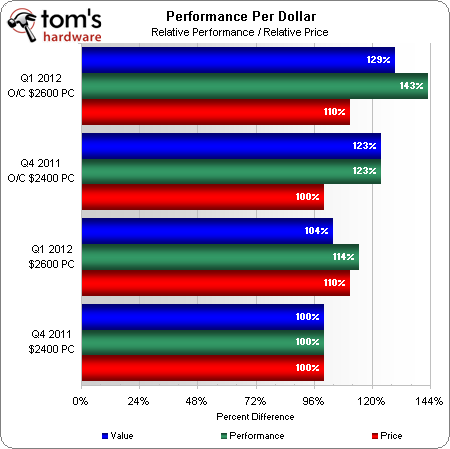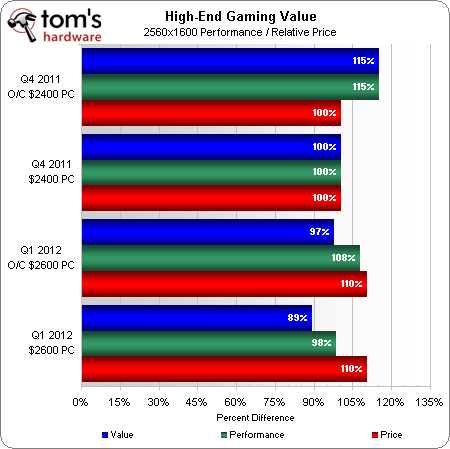System Builder Marathon, March 2012: $2600 Performance PC
Does The CPU Gamble Pay Off?
Most experienced builders are fully aware of what diminishing returns means for aggressive attempts to push higher performance. At a certain point, cost simply goes up way faster than the gains for which you pay. This is a really rough, totally seat-of-the-pants estimate, but we'd venture to say that enthusiast-oriented PCs start to see the relationship between spending more and getting more start to dip off at around the $700 price point.
Today’s build counters that trend by producing 14% better stock-speed performance than last quarter's effort at a 10% higher price.
The value win for our current build is really an indictment of its predecessor, in that too much money was devoted to graphics. The problem was that most of our games couldn’t take full advantage of all that graphics power, whereas more of our productivity and content creation titles certainly benefit from a faster CPU.
Narrowing our focus to high-resolution gaming helps us to define the unbalance, where only high-end gamers could appreciate its graphics configuration. In this context, the old system has a bigger advantage in high-end-gaming value than our new system has in overall value.
Overall value will be the focus of tomorrow's Day 4 comparison, where budgets are sized up against performance. So, so the first value chart takes precedence as we congratulate ourselves for building a system that truly equals the sum of its parts.
Current page: Does The CPU Gamble Pay Off?
Prev Page Power, Heat, And EfficiencyGet Tom's Hardware's best news and in-depth reviews, straight to your inbox.
-
llguitargr8 Just curious, did you guys purchase all these parts and right these articles before the GTX 680 was released? I really thought you guys would have gone with that, and if it wasn't because they weren't available at the time, then what makes the 7970 better in your opinion?Reply -
g-unit1111 Not sure if I agree with that choice of cooler but I definitely like the rest of the setup!Reply -
bystander llguitargr8Just curious, did you guys purchase all these parts and right these articles before the GTX 680 was released? I really thought you guys would have gone with that, and if it wasn't because they weren't available at the time, then what makes the 7970 better in your opinion?Almost all these build articles are based on purchases that took place 2 months ago. Even if they were to have bought these parts today, it would be hard to purchase a 680, as stock is a major issue.Reply -
esrever I like the build except the x79 adds like $500 extra that I see very little benefit from.Reply -
e56imfg Dang I need to win this one!! I'm so happy they balanced the CPU with the GPU this time around.Reply -
hmp_goose Good job: Working through the details of the CPU cooler like that is half the fun of this hobby. Great build.Reply -
theuniquegamer Good build . But there could be more improvement by replacing a $600 cpu and $320 mother board with a i7 2600k and a $200 z68 mother board . And also replacing the 7970($590) with 2x680 at 2x$500(from the money saved from cpu and motherboard and 7970). It may give better gaming result than this build.Reply



